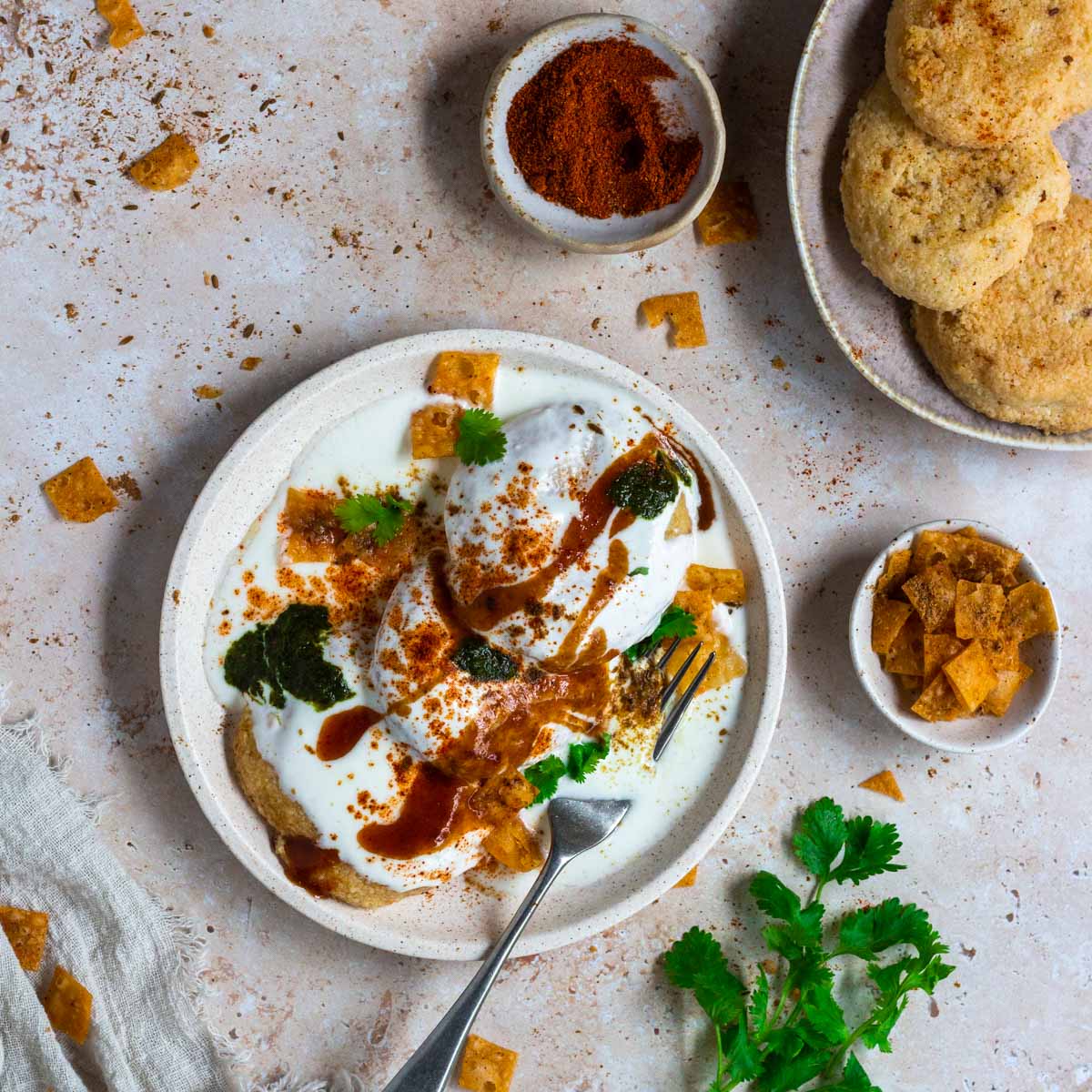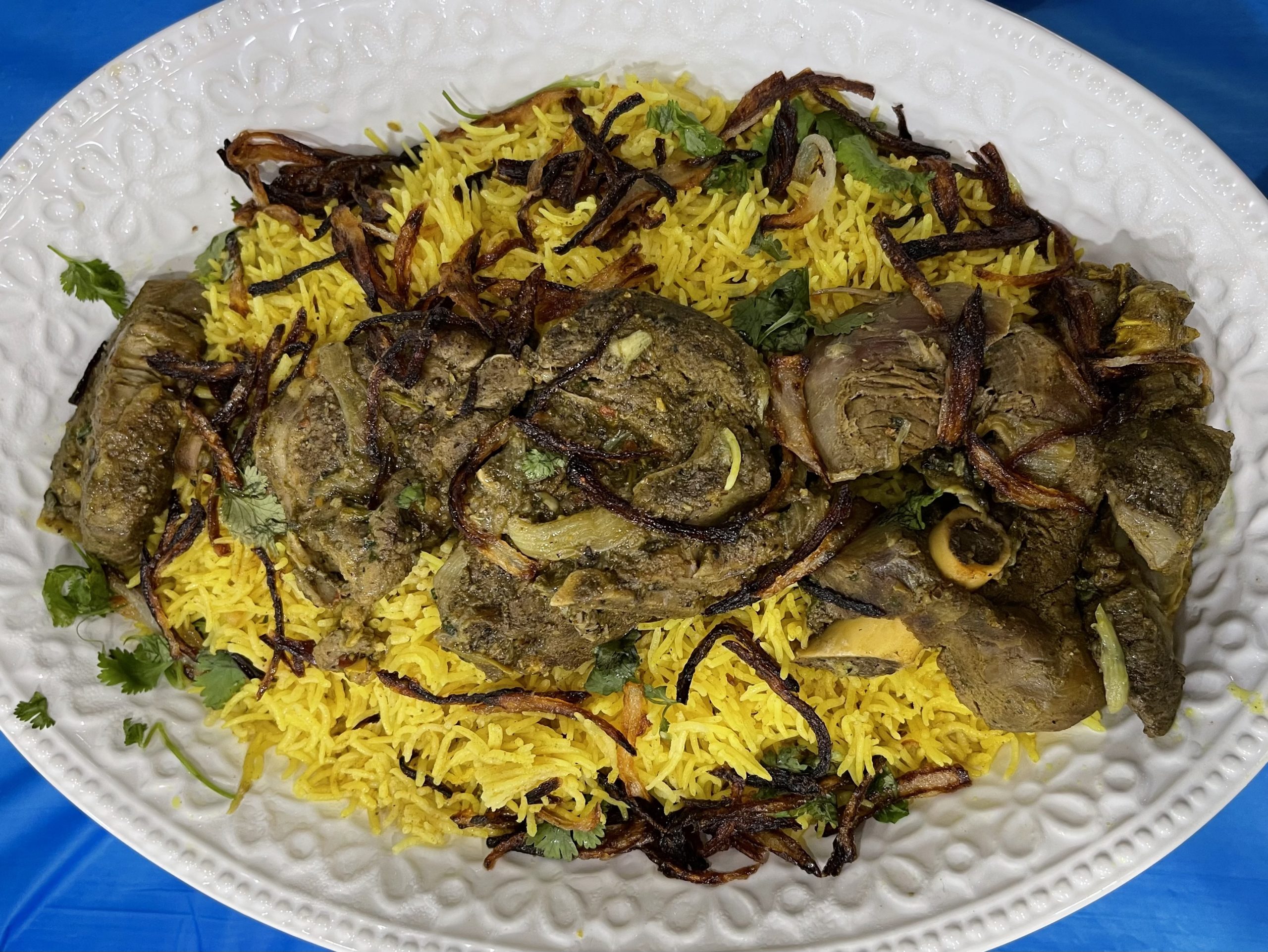Maqsood’s Fish Curry
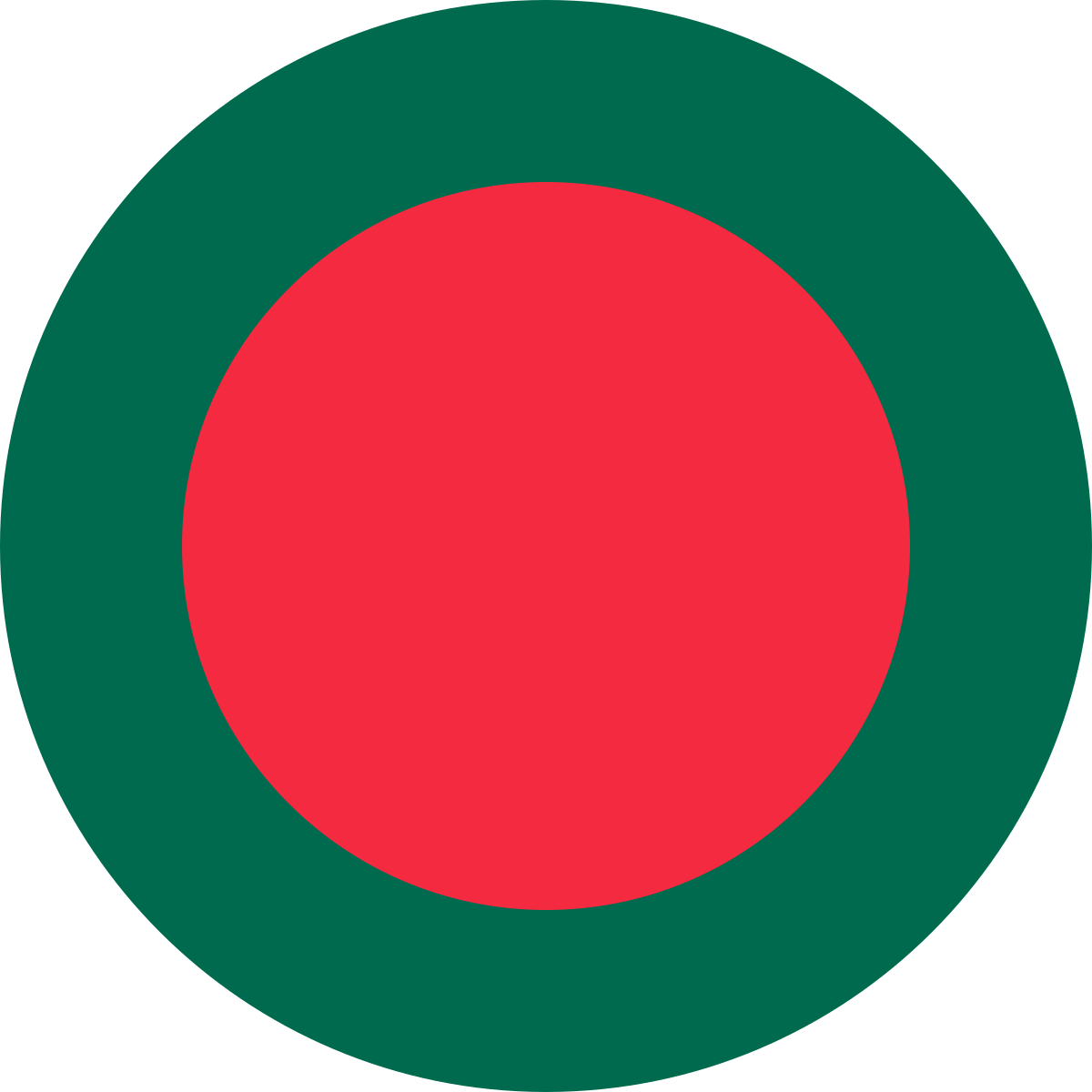 Bangladesh
Bangladesh 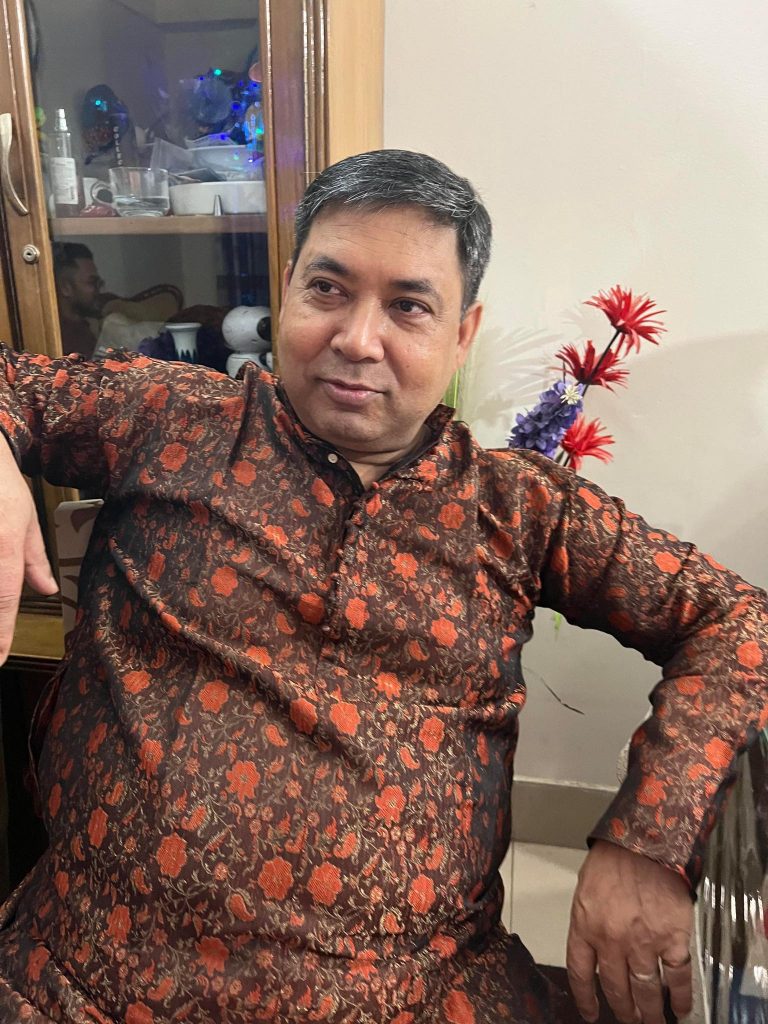
https://twitter.com/akmaqsood | https://web.facebook.com/akmaqsood/ | https://www.linkedin.com/in/akmaqsood/
I was born and raised in a conservative Bengali Muslim family in Bangladesh but since my 30s, I have aligned myself more to secularism and humanitarianism rather than identifying with one specific religion. I feel that it fits better with thinking of myself first and foremost as a member of the human race but there is much I still treasure and honour from my upbringing.
My father was an academic, a researcher and an author of Islamic history and culture and as a middle-class Bengali Muslim family in the capital city Dhaka, my parents were very mindful of both their children’s education and their religious upbringing.

In Bangladesh, around 90% of people are Muslim but a significant percentage of the population adheres to Hinduism (8.4%) and other religious groups include Buddhists 0.6%, (mostly Theravada), Christians (0.3%, mostly Roman Catholics), and Animists (0.2%).
My parents chose for me to go to a Catholic primary school which offered quality education but that didn’t place any obstruction to maintaining my faith as a young and devoted member of a conservative Muslim family. As per my family and cultural norm, I went to a local Madrasa in the morning to learn Islamic lessons and prayers, and an Imam also came to our home 2-3 times a week to tutor me in reading and reciting Quran. It was a lot of studies on top of my primary education as a 6, 7, 8 and 9 year old youngster and an inquisitive curious child.
I learned that Ramadan is ‘farz’ which is a Persian word of Arabic origin that’s also used in Urdu, Hindi and Bengali. Farz means ‘one’s duty, obligation and responsibility’ and Ramadan being farz means that it is mandatory for every able-bodied healthy Muslim of seven years of age or older to observe Ramadan as a month of fasting, prayer, reflection and community. The observance of Ramadan is one of the five pillars of Islam and the spiritual rewards of fasting are believed to be multiplied during the holy month. So Ramadan was an integral part of my childhood, my family life and culture until the time I embraced secularism in my early 30s in Australia
My parents were married in the 1950s through the traditional Bengali Muslim matrimonial process of arranged marriage. They had six children: Four girls and two boys, with the youngest one born in March 1970. I am the fifth of the six siblings.

I pay tribute to my beloved parents. I don’t know the exact details but their marriage was arranged by elderly relatives in both their families. It was a happy and successful marriage. Although my father died in 1989 and my mother survived 27 years without him, I witnessed their deep love and care for each other and their highest attention to bringing up and educating their children in righteousness in a sinful world. I believe I get my strong sense of social justice from them as much as from the teachings of Catholicism and Islam.
So the Islamic holy month of Ramadan has always been something very important in my life. We were taught from our childhood that abstaining from food and water from dawn to dusk every day for a month is a practice of sacrifice and devotion, a process of purification of the body and the soul and that abstaining from food and drinks is also about controlling our thoughts and desires.
The fasting is accompanied by an increase in prayers and restraining oneself from many worldly pleasures and vices that we carry on our everyday life. It is also a practice that helps you understand the struggle of hunger and the experiences of people who experience hunger on a daily basis not through their own choosing, but who still stay devoted to their faith.
I was also taught that fasting in Ramadan helps to rectify many health issues and the majority of people in every Muslim country practice fasting diligently regardless of whether their doctors, dietitians and nutritionists support it. Under Islamic law, the very young and the elderly, frail and sick are excused from fasting but most will fast if they feel they can. In recent years, other health experts and many recent research studies have found scientific proof that fasting cleanses and restores the workings of the mind, body and soul.
A couple of years ago, I became very interested in returning to fitness and undertaking a significant weight-loss program and from 2020, I have drawn on intermittent fasting (IF) and One Meal A Day (OMAD) habits with the earnest desire to shed a few extra kilos. I have researched and studied available talks, lectures and research on IF and OMAD from various renowned health professionals and was surprised to find that what our modern-day researchers, endocrinologists and health professionals are saying was actually set up as one of the pillars of Islam more than 1400 years ago. FASTING IS BENEFICIAL! It does of course depend on making sure that the meals you do eat are healthy and well-balanced and provide the nutrition you need. My own personal experience with intermittent fasting actually resulted in me losing 12.5kg and a significant reduction in prescription medications in just six months’ time.
As a country, Bangladesh is often called the land of rivers and because it is one of the most densely populated countries in the world, it is fairly safe to say everyone – an estimated 171 million people – lives close to a river, a lake or a canal and this influences our culture and our cuisine as well as our geography.
Although Bangladesh is less than 2% of the size of Australia and a bit smaller than the US state of Iowa, there are somewhere between 230 and 700 rivers. The Water Development Board says some 230 rivers flow in summer and winter, and 310 in summer, but another document says 405 and another estimate says there are 700 rivers but some of them are dying. In our childhood we learned that we had 1,300 rivers. Keeping track in a country like Bangladesh is hard – the rivers flow differently at different times of the year and the canals often dry up in winter, filling up again in the monsoon when the paddy fields are also flooded with water. Either way, Bangladesh is regarded as the biggest river delta in the world where much of the land has been formed by silt left behind by river flows and because it is so low-lying, the country regularly experiences flooding and cyclones and climate change is likely to present significant future problems.
Because of the geography and everyone living close to a river or lake, rice and fish are the most common foods. One of my favourite childhood memories is of family holidays staying with our grandparents in the countryside outside Dhaka and taking my fishing line down to the lakes and canals. Some Bangladeshi canals are much bigger than the rivers we see in other countries.
In Bangladesh, the majority of people consume two meals a day during Ramadan: early morning Sehri before sunrise and in the evening after sunset and the end of the daily fast, Iftar. Often for our early morning meal we eat delicious meat, chicken or fish curry and rice with seasonal vegetables and fruits. When people are preparing for Sehri, they need to make something that is quick and easy as well as balanced and nutritious to sustain them during the day. In my childhood, when refrigerators and microwaves weren’t common household appliances, most people preferred to prepare something fresh and warm rather than reheat a dish made the day before.
One of my favourites from my childhood is fish curry made with different seasonal vegetables. My favourite fish were an oily fish called Hilsha which is a kind of herring and the national fish of Bangladesh. Another I really like is called Rohu, which is a kind of Bangladeshi carp. Here in Australia, I like to make almost the same curry I remember my mother making. I can buy Hilsha herrings and Rohu if I go to South Asian food shops in western Sydney but I mostly often use salmon which is easily available.
Below is my recipe for Wild Salmon Fish and Cauliflower Curry which I like to serve with Brown Basmati Rice. Traditionally in Bangladesh it would be served with white rice but I have moved to brown rice for health reasons. In Bangladesh, we prefer to eat fish belly because it has lots of fish oil and is beneficial for physical and mental health, supporting the organs and weight loss. I use salmon fish belly because it is regarded as probably the best fish for these benefits.
The recipe below makes enough for two but can be doubled up for four and so on.
Maqsood Al-Kabir
April 2022
Share this story
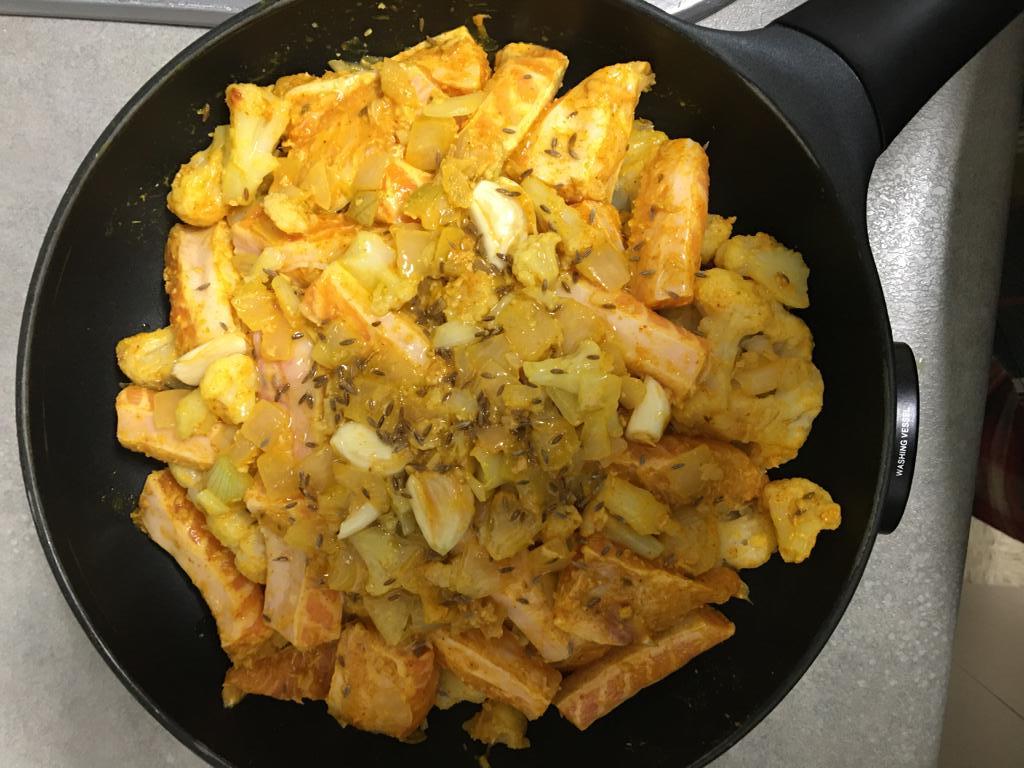
In a mixing bowl, gently mix all ingredients together to coat the salmon pieces, cauliflower and onion in the spices.
Using a non-stick frying pan with a lid, heat the oil in the pan over a low heat then add the mixed ingredients to the frypan and place the lid on the pan, keeping the heat on its lowest setting. The salmon and cauliflower both release juices so there is no need to add extra liquid to a non-stick pan. If you use a dutch oven, casserole or other pan with a lid, add one cup of water. Do not take the lid off while cooking or you will find that the curry will dry up and start catching on the bottom of the pan.
Keeping the pan on a low heat, cook this mixture for 20-30 minutes. The length of time will depend on your pan and on how cooked you like your salmon and cauliflower to be. Salmon and cauliflower both cook very quickly so be careful not to overcook. I like my salmon medium-cooked and my cauliflower crisp not soggy – ‘al dente’ as the Italians say. I find 20 minutes is enough with my electric frying pan on minimum heat.
Serve warm with rice for the best taste.
